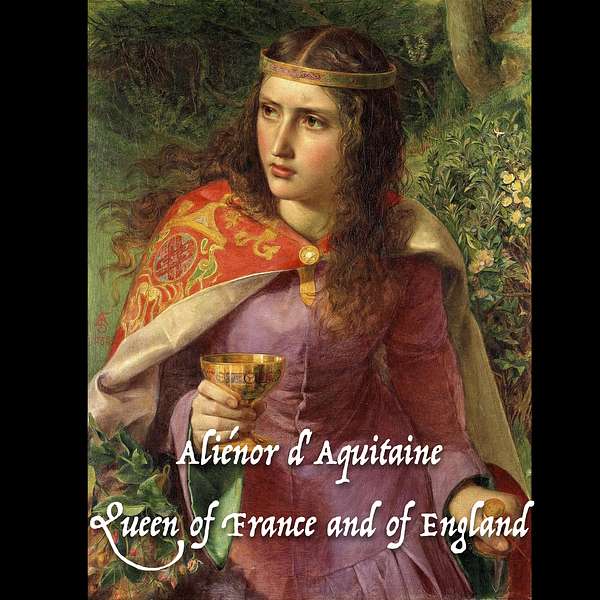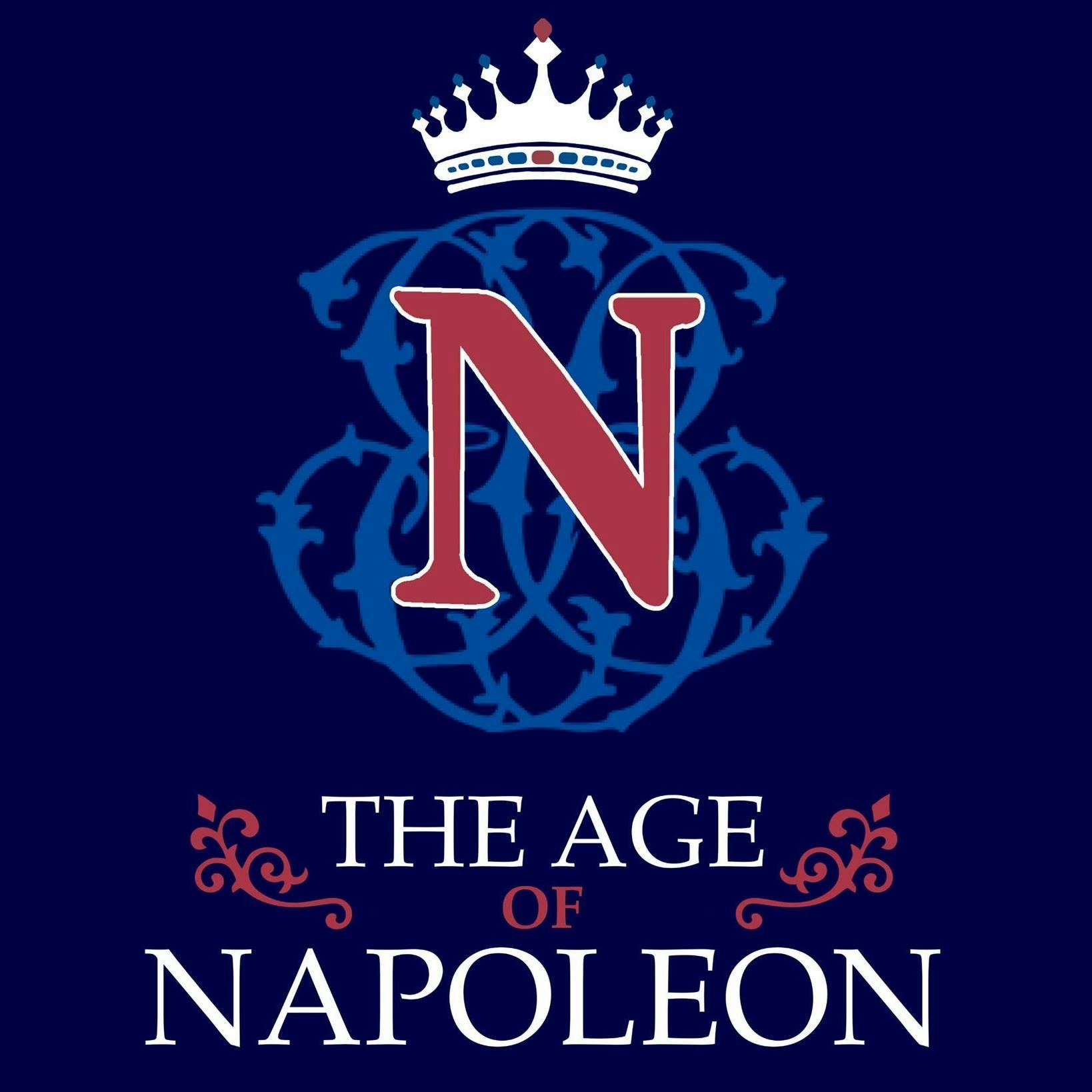
La Fayette, We Are Here!
La Fayette, We Are Here!
Aliénor d’Aquitaine, Queen of France and of England
Of the millions of people who are born every year during the Middle Ages, an extremely small number are what we call “blue bloods”, members of the nobility. Out of that already small number, a little percentage can be called “royalty”. Someone who manages to be a monarch not only for one country but for two countries, two adversaries, that is more than rare, that’s unique.
Today, we have the chance of meeting such a woman. Duchess of Aquitaine, Queen of France and Queen of England. I give you: Aliénor d’Aquitaine (Eleanor of Aquitaine).
Timecodes:
Introduction
04:19 - Aquitaine, a Country within a Kingdom
07:53 - Aliénor, Remarkable Young Woman
12:16 - Queen of France
20:18 - The Failed Crusade
25:12 - Queen of England
30:15 - The Widow
32:53 - Conclusion
Music: Marche pour la cérémonie des Turcs, composed by Jean-Baptiste Lully, arranged and performed by Jérôme Arfouche.
Art: Aliénor d'Aquitaine by Frederick Sandys, 1858
Reach out, support the show and give me feedback!
Of the millions of people who are born every year during the Middle Ages, an extremely small number are what we call “blue bloods”, members of the nobility. Out of that already small number, a little percentage can be called “royalty”. Now, someone who manages to be a monarch not only for one country but for two countries, two adversaries, that is more than rare, that’s unique.
Moreover, women are often overlooked in medieval chronicles, hidden in the shadows of their husbands or fathers. But some manage to shine so brightly, to have such an impact on their world that they cannot be ignored, dismissed or forgotten. Today, we have the chance of meeting such a woman. Duchess of Aquitaine, Queen of France, Queen of England. I give you: Aliénor d’Aquitaine.
Welcome to La Fayette, We are Here! The French history podcast for the American public. I am your host, Emmanuel Dubois, and today we are talking about Aliénor d'Aquitaine, who lived from 1122 to 1204. She is one of the most fascinating figures of the Western Middle Ages. She is also one of the few women of whom we have a proper account for almost her whole life. Chroniclers of the time often ignored women or diminished their role. In Aliénor's case, she was much too important and central to be ignored. This gives us a rare glimpse into the role of women in medieval high society.
Aliénor's origins, marriages and actions will have a tremendous impact on France, England and even Europe as a whole. She will be involved in politics of the highest importance, but also in culture. She will be at the centre of a cultural revolution called l'amour courtois, courtly love in English, which will have huge ramifications for the upcoming decades and centuries.
This tale will require some context. France at the time is far from the centralized nation we know today. It's a patchwork of duchies, counties and other territories. Plus, part of it is under control of the king of England. To spice things up even more, the French kings of the time took part in Crusades in the Middle East. As if things weren't complicated enough... Anyhow, take a seat, relax, and let's go back together to XIIth century Aquitaine, country of Bordeaux, Poitiers and, at the time of Aliénor's birth, ruled by the Duke Guillaume X.
Quick note. There is not really a "France" per se at the time, it is still called the Frankish Kingdom or Francia. Its king is King of the Franks. The transition towards the names "France" and "French" has begun, but it will take some more time. I will try to be accurate, but I might use the terms France and Frankish Kingdom, as well as French and Franks. But you know who they are, n'est-ce pas ? I will also use the French names of the French kings and queens of England because 1-they were French and 2- this is a podcast on France's history, you might as well learn some French along the way. Now, back to Aquitaine.
Aquitaine, a Country within a Kingdom
One must understand that at the time, Aquitaine had its own culture, its own traditions and its own rulers. Yes, the Duke was the vassal of the king of France, or king of the Franks, but the Duchy had a certain degree of independence. It also has very ancient roots. The Aquitani were one of the three original peoples of Antic Gaul before the Roman conquest, along with the Celts and the Belgians. It will later be incorporated in the new Frankish Kingdom by Clovis in the VIth century, but it will keep its Gallo-Roman name of Aquitaine, the only gallic territory to do so in the Frankish kingdom.
Aquitaine was even a kingdom in its own right during the Carolingian period. This helped reinforce its own identity. It also prospered and became quite rich between the IXth and XIIth centuries. It did suffer from some separations and wearing of the central power though. The Dukes of Aquitaine lost some control to their vassals, the various counts administering their counties. Such is the situation when Aliénor's father, Guillaume X, Duke of Aquitaine rules, from 1126 to 1137. A strong duchy, albeit not as united as it had been. But it offers tremendous potential and is very rich culturally.
Guillaume has three children during his marriage with Aénor de Châtellerault, a noblewoman of the region. Aliénor is the eldest, born in 1122. She has a sister, Pétronille, who is born in 1125. Finally a brother, Guillaume, who will only live four years. As I said, Aquitaine is very different from the Frankish kingdom. Its laws and traditions are its own. One big difference is that it doesn't have the Salic law, preventing women from inheriting land and titles. Therefore, in 1136, Guillaume X designates Aliénor to be his sole heir and the local nobles accept this. Guillaume dies in 1137 during a pilgrimage to Santiago de Compostela. But before, he had arranged for his daughter to marry the king of France's son, Louis. The table is set, for one of the greatest union of the XIIth century.
The idea is simple. If the Duchess of Aquitaine marries the king of the Franks, their children will be the rulers of both the Duchy of Aquitaine and the Frankish Kingdom. This union would create the most powerful state in Western Europe, a sort of throwback to Charlemagne's era. But as we'll see, things won't go exactly according to plan.
Aliénor, Remarkable Young Woman
Aliénor received an excellent education from her parents. She has a strong passion for the arts and literature. She speaks the langue d'oc, her local language which is very different from the langue d'oïl spoken in northern France. I will circle back to that. She is also fluent in latin, plays music and globally very well learned and bright. She also is an accomplished hunter and rider. On top of all that, she was trained in matters of the State at a very young age. Even though she's barely 15 when her father dies, she is more fit than most to rule an important Duchy. She will prove her worth times and times again in the succeeding years.
Things go very fast for Aliénor in 1137. Her father dies in April and she becomes the new Duchess. As was organized, she is to marry Louis VI's son, also named Louis. The young couple is married on July 25th in Bordeaux. Huge festivities are organized in the city as well as on the way back to Paris. They are crowned in Poitiers as Duke and Duchess of Aquitaine on August 8th. But before reaching the city, bad news arrive. Louis VI the Fat, king of the Franks, has died.
Aliénor sees her life accelerating. She's just become Duchess and she now has to become Queen of France, married to the new king Louis VII. She will be crowned in Bourges at Christmas 1137. This young woman, this teenager really, is now probably the most powerful and influential woman in Christendom. One could think "well, what could go wrong?". To this I'd say: everything.
The Queen is the polar opposite of her husband. He is by every account, boring, and a bigot. He dreams only of achieving great thing for the Church and Christianity. He appreciated that his new wife brought with her the territories of Guyenne, Gascogne, Poitou, la Marche, Limousin, Angoumois and Perigord, but he doesn't like her attitude. Aliénor is open-minded, energetic and way more cultivated than him. She is elegant, refined and want to bring those qualities to the court of Paris. It's a tall order.
Aliénor grew up in a colourful and active environment, Louis in a pious one. Although she also is a Christian, her vision of religion is not as rigid. It should also be said that the court of Aquitaine, were she learned everything, was one of the finest in Europe. According to various sources, it is a much more interesting place to be than Paris. Aliénor tried to energize the Parisian court by bringing artists and performers. She had many beautiful tapestries made and also bought many jewels and dresses. But all this faced a strong opposition.
Put yourself in Aliénor's shoes for a moment. You're fifteen years old. Your brother was destined to be Duke of Aquitaine but he died a child and therefore you become the heir. Within the same year, your father dies, you become Duchess, you marry the heir to the French throne, and he becomes king before the end of your wedding celebrations. You also leave a warm and enjoyable place for a cold and dull one. All in the same six months. That would exact a huge psychological toll out of anybody! But Aliénor is not just anybody. She is smart, resourceful and patient.
Queen of France
As of Christmas 1137, Aliénor is officially Queen of France. She quickly realizes that the court is hostile to her. It may sound silly for someone living in France today, but to the Parisians, she is a foreigner. I already mentioned that she doesn't even speak the same language at home. Her demeanour, her speech, everything about her is alien to them. She also dresses in a way that the courtiers find provocative. A key figure in all of this is the abbot Bernard de Clairvaux. He has the ear of the king and opposes quietly to Aliénor at pretty much every turn. It must have been very difficult for the young queen to start her new life in these conditions.
It should be said that Louis, who is only two years older than Aliénor, also had a rough couple of years. Just like her, he wasn't destined to reign. His brother Philip was supposed to rule, but he died of a horse fall in 1131. Louis's father had an almost thirty year-long reign and was very active and combative. He fought many battles, being wounded and almost killed quite a few times. It's a tough act for the new king to follow. Louis VII, who will be nicknamed Le Jeune or "The Young", because he became king at 17, will face many challenges. Some he will impose on himself, as we shall see.
Even though the court is hostile to Aliénor, the young Louis seems to fall in love with her. She definitely has a strong influence on him. Both are very young and probably needed each other's support. As I've just explained, both their lives had been turned upside down fairly quickly. Aliénor wants to play her part as Queen of France as best she can. She is not a figurehead, but a ruler. Although the true ruler is the king, she will be, for some time, his closest advisor.
Together, they face internal struggles, especially in Poitiers and Toulouse. Poitiers organizes itself as a free commune at the beginning of Louis VII's reign. It's mean to give a great deal of autonomy to the city and is a widespread phenomenon during the XIIth century. Aliénor and Louis react quickly and decisively to prevent that. They besiege the city but it is retaken without bloodshed. It's all well and good, but Louis wants some kind of insurance. He wants the leaders of the city's to be made hostages to enforce the decision. The Abbot Suger, who was Louis VI's main advisor, is against that idea and convinces the king to change his mind. Apparently, Aliénor didn't appreciate that and had him remove from the council at the time. We are not sure if this is exactly what happened, but this is how it was perceived and it tarnished Aliénor's image.
The second blow came when Louis VII tried and failed to conquer Toulouse. Aliénor believed it should be hers, because her grand-mother was Philippa de Toulouse. To thank her husband for his efforts, she offered him a superb crystal vase, known as the Vase d'Aliénor. It had been given to her grand-father, Guillaume IX, by Imad al-Dawla Abdelmalik, the muslim king of Saragossa. You can still admire it at the Louvres. This fruitless endeavour also contributed to the queen's bad image in the Frankish kingdom, as many thought she was its only cause. I personally don't believe that. Louis was king and, just like his father before him, was trying to reinforce his power and authority. Having a wife with a claim on Toulouse was a nice excuse to try and annex it. But since it failed, it was his wife's fault in the eyes of the contemporaries and chroniclers.
I want to digress a bit and talk about Aliénor's importance for the medieval arts, especially literature. I already mentioned Aliénor's passion for the arts as well as her culture. A key aspect of medieval literature is known as courtly love or amour Courtois in French. It started showing up at Guillaume IX's court in Aquitaine. It was known in langue d'Oc as fin'amor (the term "courtly love" being nailed by Gaston Paris in 1883). This way of writing and singing love in a respectful, honest and elegant manner will become a pillar of Western Medieval culture. Aliénor was in the middle of it and recognized its importance. She did her best to promote it and to help writers get them the attention they deserved. One of them, was Chrétien de Troyes.
You probably heard of Chrétien de Troyes. But you are surely acquainted with his most famous stories, or stories inspired by his writings. The Holy Grail, Lancelot, the Knights of the round table, king Arthur, etc. These tales inspired and influenced generations of writers in the Middle Ages and even to this day. It is also the beginning of the "roman" or "novel" in English, a new literary form at the time.
Instead of singing stories, one should read them in longer form. In those, the knight pays homage to his lady in the same way that a vassal pays homage to his lord. These stories will inform medieval culture and chivalric values as we know them now. Aliénor is the one who brought these to the Parisian court and to the rest of the kingdom. Her daughters, especially Marie, will continue on and solidify their mother's work. Aliénor will also bring those stories and values with her in England later, as we'll see.
Before that, two more elements will come to torpedo the royal couple during the 1140's. First, they didn't have boys. It should be reminded that to most people of the time, the first task of any queen was to produce an heir to the throne. Should they failed to do that, it was considered their fault. Aliénor and Louis had two daughters: Marie, born in 1145 and Alix, born in 1150. But no boys. That was a serious issue. But the last straw didn't happen in France. It happened many miles away, when the Queen and King went together, and an army, to lead the Second Crusade in Holy land.
The Failed Crusade
Even though Louis VII is very religiously devoted, he often has issues with the Papacy and the Clergy. A good example of that is the conflict between him and Pope Innocent II in 1141 about the vacant archdiocese of Bourges. The Pope's candidate was Pierre de la Châtre, but the king wants his own candidate to become archbishop. De la Châtre finds refuge at Thibaud de Champagne's. Vexed, King Louis attacks Champagne and burns the town of Vitry in 1142. After more bloodshed and destruction, the Pope forces the King to accept his candidate in 1143.
Louis has to beg forgiveness for his actions and he finds a way. On Christmas Day 1145, he announces a Crusade in Syria to help out his fellow Christians. He is heavily influenced by Bernard de Clairvaux in this endeavour. The king will go to the Holy Land with Frankish knights, soldiers and his young wife. He leaves abbot Suger as regent during their absence.
At this time, the royal couple is still working but cracks are appearing. The opposite characters and education of the queen and king are becoming more and more apparent. Aliénor sees this as an adventure and an opportunity to learn about the Orient. Louis only wants to expunge his sins and to push Christendom forward. The gruelling conditions of the Crusade as well as its ultimate failure, will lead to the inevitable, the couple's separation. But let's not get ahead of ourselves.
In 1147, they leave France for the Middle East. They were preceded by their allies of the Holy Roman Empire, under the leadership of Emperor Conrad III. Instead of waiting for his French allies, the emperor has decided to go in enemy territory by himself. It was a very bad idea, about two thirds of his army gets either killed or captured by the Turks at the battle of Dorylaeum in 1147. When the French finally arrive, they find a weakened and demoralize ally waiting for them. This Crusade hasn't began very well...
Louis and Aliénor are a bit behind their army. They've reached Constantinople in October 1147, after months of perilous voyage. The Queen is fascinated by the city and its marvels. She is curious and want to visit every important site, every library, to meet artists and intellectuals. Louis doesn't care about all that, he just cares about the Crusade. Aliénor has more and more trouble to deal with her husband. He his only 25 and she gets getting frustrated by him. In early 1148, they leave Constantinople and head for Antioch.
They are welcomed by Raymond de Poitiers, prince of Antioch and Aliénor's uncle. She loves her uncle and starts spending a lot of time with him. They talk during hours, laugh and basically have a good time. Of course, Louis doesn't partake in all of that, he's worried about this Crusade that looks more and more like an utter failure. Of course, the relationship between Aliénor and Raymond soon spreads rumours of infidelity. Those are probably unfounded, but it's another sign that the couple is completely malfunctioning.
When Louis announces that he wants to go to Jerusalem, Aliénor says that she wants to stay in Antioch with her uncle. Louis insists. Aliénor refuses and now claims to want to dissolve the marriage altogether! Louis is flabbergasted. He doesn't want to lose his wife and especially not the whole region that comes with her. But the wheels are in motion and when the Crusade ultimately fails and the couple comes back to France, in separate voyages it should be said, it's only a matter of time before everything breaks down.
Queen of England
Aliénor wants to divorce on the basis of consanguinity to the sixth degree. I think you cannot find a more medieval legal cause than this. It works, Louis has to accept it. The marriage is dissolved during the Council of Beaugency in 1152. Louis has lost his wife and with her, the beautiful and rich land of Aquitaine. What he doesn't know yet, is that Aliénor has eyes on another man. The richest and most powerful vassal of the French King. Henri Plantagenêt, count of Anjou and Duke of Normandie.
Henri Plantagenêt is the son of Geoffroy d'Anjou and Empress Mathilde. Long story short, England is under the rule of Étienne (or Stephen in English) and is going through a Civil War. Henri had already tried to conquer England in the 1140's and has worked very hard to reinforce his position in France too. One element of that is the secret correspondence he has with Aliénor. Normandie and Anjou are already very independent and powerful. Add to that Aquitaine, and you have a huge chunk of France in the hands of what we could call a "Super Duke". Aliénor sees that too, plus Henri seems way more interesting that the boring Louis. They marry in 1152, a mere two months after the divorce.
Aliénor is now the partner of one of the rising stars of the time. She is older than him by ten years and was a huge help to him. She knows the court of France, she knows the nobles, the clergymen and the king. She helps Henri stabilize his situation on the continent, for he has eyes on the English throne. Following the treaty of Winchester, the king of England Étienne recognizes Henri has his adoptive son and successor. Étienne dies in 1154 and Henri becomes King of England. Aliénor is now Queen, for a second time. She brings with her all the artists, writers, singers and performers that she loved so much. She transforms the English court and has a tremendous impact on English culture and literature.
Aliénor and Henri have eight children during their marriage. Two of them will become kings of England. Richard Cœur de Lion, or Richard the Lionheart, and Jean sans Terre, or John Lackland. On top of having eight pregnancies in thirteen years, a remarkable feat, Aliénor proves a capable and proactive queen. She administers Aquitaine herself, while Henri is more focused on England and Normandie. They really are a medieval power couple. Their Empire goes from Scotland to the Pyrénées, it dwarfs the king of France's possession and power.
Back in Aquitaine, Aliénor creates the richest, most advanced court of Europe. On top of the artists that flow there, creating artworks for the ages, she also encourage intellectuals and lawmen to improve her duchy. Under her guidance, a very well thought-out maritime code, the Code de l'Oléron, is established in 1160. Communes are favoured, to improve the economical dynamism of various cities. Aquitaine flourishes under her reign. But things start they get sour in her couple, for a second time, in the 1170's.
The kings' sons, in particular the eldest, Henri, revolt against their father in 1173. His brothers Geoffroy and Richard go along with him and gain the support of Louis VII of France. A real civil war ensues in Normandie and England, but it is short lived. Henri II gains the upper hand quickly. Aliénor supports her children agains their father, she even reaches out to the French king for help. She is finally captured and send to prison in Chinon. She will be sent back to England and spend the next fifteen years of her life in captivity in various castles. But we haven't heard the last of her just yet.
The Widow
Henri II dies in 1189 and Richard becomes Richard Ist of England. He frees his mother and she starts working with him. She is 77 at the time, but it doesn't seem to bother her. Very soon after, Richard leaves England for the Holy land to join the Third Crusade. Aliénor administers the kingdom in his absence. She also have to bring him his promised wife, Bérengère de Navarre, all the way to Limassol, on Cyprus. She does that in the middle of winter 1191 and the couple is married there in May. She then heads back to England where her other son, Jean, is trying to usurp the throne. What a family life she had!
Richard also wants to go back to England after the crusade, but his is capture in 1195 by Leopold V, Duke of Austria. Aliénor protests to the Pope, arguing that a crusader should be protected in Christendom. But the Pope ignores her. She therefore has to find ways to raise money for the huge ransom required for his liberation, 100,000 pounds of silver. It represent multiple times the annual revenue of the English crown at the time. Richard is now in the hands of Henry VI, Holy Roman Emperor. Aliénor brings the ransom herself to Mainz, in Germany.
Aliénor is not done pulling the strings of European Royals. She helps her son Jean to keep his claim to the English throne, even after everything he did to Richard, who died in France in 1199. She then sets on to have her grand-daughter, Blanche de Castille, marry the son of the French king. To do so, she travels all the way to Castille in 1202. She is over 80 years old by then. She succeeds, and Blanche will herself be a great queen, regent and mother of Louis IX, one of the greatest French monarchs.
She then retires in Fontevraud and dies in Poitiers on March 31st 1204. Almost to her last breath, she fought for her children, for her legacy and for Aquitaine.
Conclusion
Aliénor d'Aquitaine was at the centre of power of two major kingdom during the twelve century. Duchess of Aquitaine, Queen of France, Queen of England, she was closer to power than almost anybody at the time. Being a woman, she had to face considerable odds and prejudice to make her way in the medieval political arena. She used her intelligence, culture and finesse to have her way. And when she saw that she was in an impossible situation, she managed to find a way out.
Had she been alive today, I think she would have been either a great politician or entrepreneur. She had an incredible energy, favoured arts and culture and clearly loved her homeland of Aquitaine. She also fought for her children, even those who behaved very badly! She also didn't fear her husbands, her King husbands. She faced them and paid the price for it. She held true to her principles, and that I think should be admired.
Aliénor and Henri Plantagenêt started the famous English dynasty. Thanks to her love for literature and culture, the English folklore was changed forever, with her importation of tales of chivalry and courtly love. She had a tremendous impact of the culture of both kingdoms during her 82 years-long life. Because she was smart, because she was witty, because she was a woman, a dark legend was created around her. She was portrayed as a seductress and a manipulator. But no, she was a woman in a man's world, doing her best for herself and her loved ones. Was she perfect? Of course not. But she was, I think, brave and intelligent. I certainly hope that we can all appreciate that.
Thank you for listening, au revoir.
Podcasts we love
Check out these other fine podcasts recommended by us, not an algorithm.

Generals and Napoleon
John W. Viscardo
Shipwrecks and Sea Dogs
Rich Napolitano
French Revolution & Napoleon (Grey History)
Grey History (William Clark)
The Life and Times of Frederick the Great
Alec Avdakov
The Age of Napoleon Podcast
Everett Rummage
The Siècle History Podcast
Evergreen Podcasts
The Napoleonic Wars Podcast
Zack White
Worlds Turned Upside Down
Roy Rosenzweig Center for History and New Media
Empire-Builders
David Mainayar
Battles of the First World War Podcast
Mike Cunha
New York, Quebec, and The Water Route to the Center of the World
William Matthews
Deep into History
Deep into History
Battle Royale: French Monarchs
Ben Clarke and Eliza Sommers
A History of Japan
Justin Hebert
The French History Podcast
Evergreen Podcasts
History of the Germans
Dirk Hoffmann-Becking
Half-Arsed History
Riley KnightFrench-Canadian Legacy Podcast
French-Canadian Legacy Podcast
The History of England
David Crowther
Canadian History Ehx
Craig Baird
Hugos There Podcast
Hugos There Podcast
Hugo, Girl!
Hugo Girl

